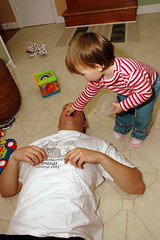Sunday, June 21, 2009
Over at Psychology Today...
I've been continuing the theme of investigations of small children's inner experience... the latest installment can be read here.
Friday, June 19, 2009
Feeding ourselves
 Image by kingary via Flickr
Image by kingary via Flickr
What's the explanation? Some evolved mechanism for automatically modelling eating actions, to ensure that those who depend on us are well fed? Something to do with mirror neurons? In acting out the eating, I am configuring my own facial muscles in the way I want the toddler to do. That means that, at some level, I must be mapping the features and actions of my own body on to his. Generally I think mirror neurons are a little overrated (I do not see, for example, how they can be anything more than a useful platform for social cognition and theory of mind) but here's something they could be helping out with.
I've noticed that the reflective feeding effect generalises, too. When you are helping a toddler to brush her teeth, you will probably find that you are sometimes contorting your lips in the way you want the child to do. The problem with the 'modelling' theory is that it suggests that this behaviour is intentional; that we parents are doing this for a purpose, to show the child how the thing should be done. It could be something much more reflexive, unconscious and automatic: a by-product of evolution, psychological development, or both.
Then, the other day, I noticed Isaac doing the same thing. He was feeding me a bit of ice lolly and mouthing the grateful acceptance he wanted my mouth to show. He's five, but he too was unable to suppress this instinct to model the feeding process. It's not only parents who can't keep their own selves still. My hunch is that the effect is specific to actions that involve the face and mouth, but I could well be wrong about that. What do readers think?
Labels:
parenting,
social development,
theory of mind
Wednesday, June 3, 2009
Dutch edition
 The Dutch translation of the book is now available. The publisher is Contact and the translator is Rogier van Kappel. More information on the edition is available here. You can order the book here.
The Dutch translation of the book is now available. The publisher is Contact and the translator is Rogier van Kappel. More information on the edition is available here. You can order the book here.
Tuesday, June 2, 2009
Subscribe to:
Posts (Atom)
![Reblog this post [with Zemanta]](http://img.zemanta.com/reblog_e.png?x-id=feb2ffa5-3219-47f9-9c02-340184447945)




